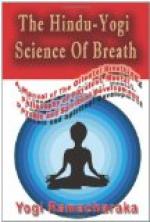Differ as they may upon details of theory and terminology, the Oriental and the Occidental agree upon these fundamental principles.
To breathe is to live, and without breath there is no life. Not only are the higher animals dependent upon breath for life and health, but even the lower forms of animal life must breathe to live, and plant life is likewise dependent upon the air for continued existence.
The infant draws in a long, deep breath, retains it for a moment to extract from it its life-giving properties, and then exhales it in a long wail, and lo! its life upon earth has begun. The old man gives a faint gasp, ceases to breathe, and life is over. From the first faint breath of the infant to the last gasp of the dying man, it is one long story of continued breathing. Life is but a series of breaths.
Breathing may be considered the most important of all of the functions of the body, for, indeed, all the other functions depend upon it. Man may exist some time without eating; a shorter time without drinking; but without breathing his existence may be measured by a few minutes.
And not only is Man dependent upon Breath for life, but he is largely dependent upon correct habits of breathing for continued vitality and freedom from disease. An intelligent control of our breathing power will lengthen our days upon earth by giving us increased vitality and powers of resistance, and, on the other hand, unintelligent and careless breathing will tend to shorten our days, by decreasing our vitality and laying us open to disease.
Man in his normal state had no need of instruction in breathing. Like the lower animal and the child, he breathed naturally and properly, as nature intended him to do, but civilization has changed him in this and other respects. He has contracted improper methods and attitudes of walking, standing and sitting, which have robbed him of his birthright of natural and correct breathing. He has paid a high price for civilization. The savage, to-day, breathes naturally, unless he has been contaminated by the habits of civilized man.
The percentage of civilized men who breathe correctly is quite small, and the result is shown in contracted chests and stooping shoulders, and the terrible increase in diseases of the respiratory organs, including that dread monster, Consumption, “the white scourge.” Eminent authorities have stated that one generation of correct breathers would regenerate the race, and disease would be so rare as to be looked upon as a curiosity. Whether looked at from the standpoint of the Oriental or Occidental, the connection between correct breathing and health is readily seen and explained.




